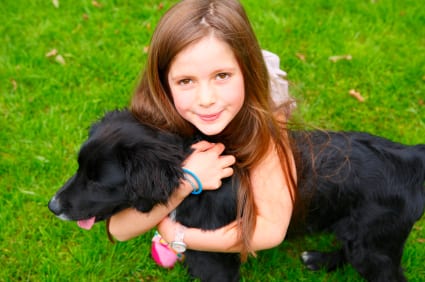Kids and dogs often form a strong bond, but there are several considerations before running off to pick up your new puppy. Choosing a pup that matches your family’s needs increases the chances of the new pet working out long-term. The type of dog also affects safety, both for your kids and the dog. A tiny dog with rough children could get injured, while a large, aggressive dog could harm your child. Here are eight factors to consider when shopping for a puppy!
Evaluate
Evaluate your family situation and needs, such as family members with asthma or potential allergies that could be aggravated by a dog. Consider a breed that doesn’t usually cause allergic reactions, such as schnauzers, poodles, Maltese, bichon frise or soft-coated wheaten terrier.
Age
Consider the age of your kids and their normal way of playing, whether rough or gentle. Choose a dog that is compatible with the age and size of your children, as well as the way your child normally acts.
Space
Estimate the amount of space you have available for a dog to run and play. Determine how much each breed needs to run and exercise as you narrow down your options. If you are choosing a puppy, account for the full adult size, not just the puppy’s current size when considering how much space is available.
Talk
Talk with friends and family who have dogs. Note how the different dogs act in general and how they interact with your children. Consider how your children respond differently to each dog.
Visit
Visit animal shelters as a family to check out the different dogs available for adoption. Observe how the dogs and kids interact to find the best match.
Read
Pick up a pet guide if you are considering a specific breed of dog vs. a mixed breed dog. Use the guide to assess the dog’s temperament to determine if it is appropriate for your kids based on their ages and personalities.
Call
Call a veterinarian if you are still unsure about the best dog for your family. A vet might give you some additional insight about particular breeds or types of dogs.
Observe
Observe the actual dog you are considering. While a particular breed might typically be gentle and good with kids, don’t assume that every dog in that breed will be that way.





